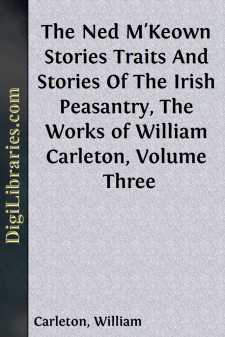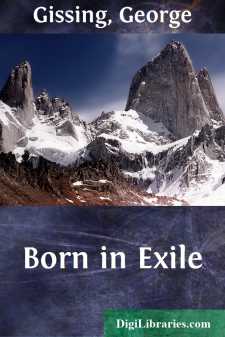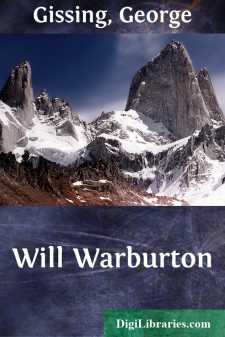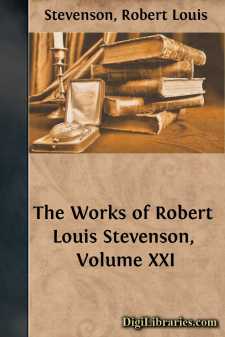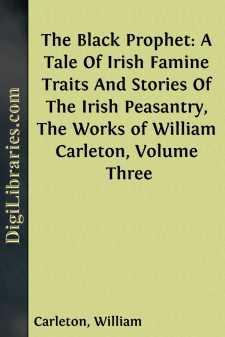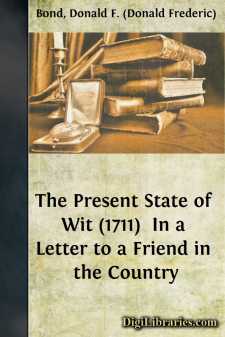Literary Collections
- American 84
- Ancient, Classical & Medieval 14
- Asian 1
- Australian & Oceanian 1
- Canadian 55
- Continental European 121
- English, Irish, Scottish, Welsh
- Essays 160
- General 24
- Letters 46
- Middle Eastern 1
English, Irish, Scottish, Welsh Books
Sort by:
A MIST WRAITH The autumn afternoon was fading into evening. It had been cloudy weather, but the clouds had softened and broken up. Now they were lost in slowly darkening blue. The sea was perfectly and utterly still. It seemed to sleep, but in its sleep it still waxed with the rising tide. The eye could not mark its slow increase, but Beatrice, standing upon the farthest point of the Dog Rocks, idly...
more...
by:
William Carleton
INTRODUCTION. It will naturally be expected, upon a new issue of works which may be said to treat exclusively of a people who form such an important and interesting portion of the empire as the Irish peasantry do, that the author should endeavor to prepare the minds of his readers—especially those of the English and Scotch—for understanding more clearly their general character, habits of thought,...
more...
by:
George Gissing
CHAPTER I The summer day in 1874 which closed the annual session of Whitelaw College was marked by a special ceremony, preceding the wonted distribution of academic rewards. At eleven in the morning (just as a heavy shower fell from the smoke-canopy above the roaring streets) the municipal authorities, educational dignitaries, and prominent burgesses of Kingsmill assembled on an open space before the...
more...
by:
Andrew Lang
JOHN AMEND-ALL On a certain afternoon, in the late spring-time, the bell upon Tunstall Moat House was heard ringing at an unaccustomed hour. Far and near, in the forest and in the fields along the river, people began to desert their labours and hurry towards the sound; and in Tunstall hamlet a group of poor country-folk stood wondering at the summons. Tunstall hamlet at that period, in the reign of old...
more...
by:
Charles Dickens
CHAPTER I—THE VILLAGE “And a mighty sing’lar and pretty place it is, as ever I saw in all the days of my life!” said Captain Jorgan, looking up at it. Captain Jorgan had to look high to look at it, for the village was built sheer up the face of a steep and lofty cliff. There was no road in it, there was no wheeled vehicle in it, there was not a level yard in it. From the sea-beach to the...
more...
CHAPTER I. After a long sleepless night of tossing to and fro, Vixen rose with the first stir of life in the old house, and made herself ready to face the bleak hard world. Her meditations of the night had brought no new light to her mind. It was very clear to her that she must go away—as far as possible—from her old home. Her banishment was necessary for everybody's sake. For the sake of...
more...
by:
George Gissing
CHAPTER 1 The sea-wind in his hair, his eyes agleam with the fresh memory of Alpine snows, Will Warburton sprang out of the cab, paid the driver a double fare, flung on to his shoulder a heavy bag and ran up, two steps at a stride, to a flat on the fourth floor of the many-tenanted building hard by Chelsea Bridge. His rat-tat-tat brought to the door a thin yellow face, cautious in espial, through the...
more...
CHAPTER I INTRODUCES THE ADMIRAL When Dick Naseby was in Paris he made some odd acquaintances, for he was one of those who have ears to hear, and can use their eyes no less than their intelligence. He made as many thoughts as Stuart Mill; but his philosophy concerned flesh and blood, and was experimental as to its method. He was a type-hunter among mankind. He despised small game and insignificant...
more...
by:
William Carleton
CHAPTER I. — Glendhu, or the Black Glen; Scene of Domestic Affection. Some twenty and odd years ago there stood a little cabin at the foot of a round hill, that very much resembled a cupola in shape, and which, from its position and height, commanded a prospect of singular beauty. This hill was one of a range that ran from north to southwest; but in consequence of its standing, as it were, somewhat...
more...
INTRODUCTION Gay's concern in his survey of The Present State of Wit is with the productions of wit which were circulating among the coffee-houses of 1711, specifically the large numbers of periodical essays which were perhaps the most distinctive kind of "wit" produced in the "four last years" of Queen Anne's reign. His little pamphlet makes no pretence at an analysis of true...
more...



